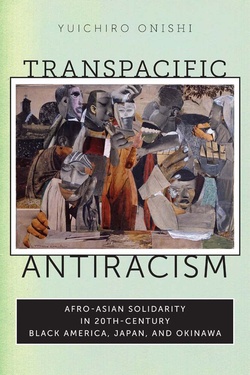It’s largely forgotten today that W.E.B. Du Bois was an admirer of Imperial Japan. Du Bois celebrated Japan’s 1905 victory over Russia for breaking the myth of white supremacy. And throughout the 1930s, he took at face value Japan’s propaganda about a Pan-Asian front united against white imperialism against all evidence to the contrary. Yet rather than dismissing Du Bois’s appreciation for Japanese Pan-Asianism as simply a “stupendous failure in judgment,” Yuichiro Onishi invites us to see it as an early, though flawed, instance of imagining an Afro-Asian solidarity united against a “world structured by white polities, interests, and mores” (p. 5).
In his book’s first two chapters, Onishi examines what he calls the “pro-Japan provocation” among early twentieth century black intellectual-activists—how they interpreted Japan’s challenge to white imperialists as a call for nonwhite solidarities on a global scale. Japan’s utility as a “race rebel” plummeted among most New Negro radicals soon after World War I, but Du Bois remained steadfast. Emphasizing Du Bois’ interpretation of newly freed slaves attempting to make a world anew in the aftermath of slavery, Onishi sees a similarity in Du Bois’ belief in Japan’s potential in making epistemic break from the white-dominated imperialist world.
The second half of the book explores how the black radical tradition and its call to complete the unfinished fight for democracy and freedom inspired activists across the Pacific in Japan and Okinawa. The book’s third chapter examines leftist Japanese intellectuals after the Occupation. For radical Japanese intellectuals like Nukina Yoshitaka, the devastation of war and Imperial Japan’s utter defeat opened up exciting new possibilities for a world beyond imperialist rivalries and capitalism. Onishi shows that founders of Black Studies in Japan—like their cohorts elsewhere—dreamt of Afro-Asian solidarities even before Bandung. Later, the Vietnam War and the continuing occupation of Okinawa allowed, at last, opportunities such dreams to be partly realized. Thus Onishi focuses his fourth chapter on Black GIs based at Kadena who refused to kill fellow people of color found allies among Japanese and American pacifists, as well as some white GIs. The recognition of the possibilities of coalition-building in that instance, though not long-lasting, needs to be better understood and indeed, celebrated, according to Onishi.
These four instances of intellectuals and activists seeking new political and material realities all operated in what Onishi calls a “racial groove.” That is to say they moved with a deeply felt comprehension that race was not merely identity, but a category of recognition about shared histories and shared fates that crossed geographic boundaries, including the Pacific. Still the tales that Onishi tells are not romanticized. Included are distressing examples of Du Bois’ disregard for Chinese lives and Okinawans’ racism towards black GIs. Space allotted for this review, moreover, fails to convey the nuances of the stories Onishi weaves together.
That said, Onishi is unapologetically hopeful that another world is possible. He ends his book with a story about a time when he taught African American Studies to a class mostly of students of African descent. It was challenging for all involved, but they managed to create a discursive space of understanding. Onishi concludes, “Contained in this experience was a tale of utopian potential” (p. 187).
Transpacific Antiracism: Afro-Asian Solidarity in 20th-Century Black America, Japan, and Okinawa
By Yuichiro Onishi
(New York: NYU Press, 2013)
*This book review was originally published in the Journal of American History (2014) 101 (3): 957-958. The Japanese American National Museum received permission from the Oxford University Press to share this review on Discover Nikkei for view only (Territory: World Language: English). For all other uses, please contact journals.permissions@oup.com for permissions.
© 2014 Naoko Shibusawa. Published by Oxford University Press on behalf of the Organization of American Historians. All rights reserved.



